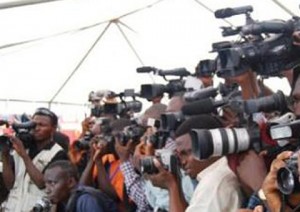Supreme Court restrains NMC’s media law
 The Supreme Court has restrained the National Media Commission (NMC) from implementing the new law requiring media owners to seek content approval from the Commission before publication.
The Supreme Court has restrained the National Media Commission (NMC) from implementing the new law requiring media owners to seek content approval from the Commission before publication.
Ghana Independent Broadcasters Association (GIBA) had gone to court over the new regulations praying the court to strike out the new law.
According to GIBA some of the regulations were inconsistent with the 1992 Constitution which guarantees unfettered media freedom.
GIBA noted that some aspects of the L.I somewhat reintroduced the repealed Criminal Libel Law.
The new L.I empowers the NMC to grant content authorisation to an electronic operator or revoke same if it goes contrary.
The Content Standards Regulation 2015 also entreats all radio and television stations to seek content authorisation from the NMC before airing a particular programme or in default pay a fine or serve between two and five years in jail.
GIBA specifically wants the apex court to expunge regulations 3, 4, 5, 6, 7, 8, 9, 10, 11, 12 and 22 of the NMC (Content Standards) Regulations 2015 (LI 2224) as being inconsistent with the 1992 Constitution which guarantees unfettered media freedom.
The regulations in contention basically require media owners to apply for content authorisation, submit programme guide and content for approval and go by a set of rules stipulated by the NMC or in default pay a fine or serve between two and five years in jail.
Dissatisfied with the new regulations and what it said was a threat to press freedom, GIBA invoked the original jurisdiction of the Supreme Court.
It was seeking a “declaration that upon a true and proper interpretation of articles 162 (1), 162 (2), 162 (4), 167 (d) and 173 of the 1992 Constitution, neither the government of Ghana nor any state institution created under the 1992 Constitution, including the NMC, shall engage in acts or exercise any powers that are likely to amount to censorship, control and direction of the institutions of mass media communication in Ghana.
“No institutions of mass media communication shall be criminally penalised for their failure to procure authorisation for the content of their publication from the government or any state institution created under the 1992 Constitution, including the NMC,” the GIBA reliefs said.
The applicant, which joined the Attorney-General as the first defendant, is seeking a declaration that the said regulations 3, 4, 5, 6, 7, 8, 9, 10, 11, 12 and 22 of the NMC (Content Standards) Regulations 2015( LI 2224) in so far as their cumulative effect was to give the NMC the power to determine which content can be conveyed by operators on a public electronic communications network, amounts to censorship of the media and same contravenes articles 162 (1) and (2) of the 1992 Constitution and is, therefore, void.
“A declaration that the regulations 3,4, 5, 6, 7, 8,9, 10, 11, 12, and 22 of the National Media Commission (Contents Standards) Regulations 2015, LI 2224, in so far as they give the NMC the power to determine content that can be conveyed by the operators on a public electronic communications network.
“A public electronic communications or a broadcasting service amounts to control and direction over the professional functions of the operators and same contravenes and is inconsistent with Article 163 (4) and Article 167(d) and Article 173 of the 1992 Constitution and, therefore, void.
“A declaration that the provisions under the standard guidelines referred to under Regulation 12 and specifically listed under the third schedule of the NMC (Content Standards) Regulations 2015 (LI 2224) which prefers criminal sanctions upon infractions of the standard guidelines are legally vague and also inconsistent with the spirit and letter of Article 162 (4) and Article 167 (d) of the 1992 Constitution and therefore void.
“An order deleting, expunging or striking out regulations 3, 4, 5, 6, 7, 8, 9, 10, 11 and 22 of the National Media Commission (Content Standards) Regulations 2015( LI 2224) on the grounds that they are unconstitutional,” the applicant stated.
Source: GNA
